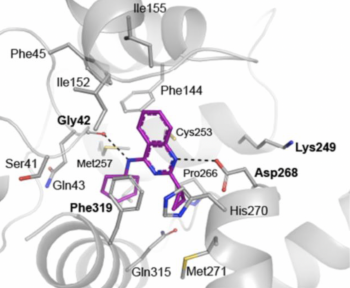24 Jun 2022 - Drug development collaboration with Karolinska Institute and SciLifeLab
The IBC2 chemical screening unit under the lead of Alexandra Stolz contributed to a study now published in Science. In the study, researchers from Karolinska Institutet and colleagues improved the function of a protein called OGG1, an enzyme that repairs oxidative DNA damage, implicated in ageing and diseases such as Alzheimer’s, cancer, and autoimmunity. The team examined how catalyst molecules, previously described by others, bind to OGG1 and affect its function in cells. One of the molecules proved to be of particular interest: it enabled the enzyme to cut DNA in an unusual way such that it no longer required its usual counterpart, APE1 to work, but relied on another protein called PNKP1. Potentially, OGG1 proteins improved in this way can be exploited as novel drugs for diseases in which oxidative damage is implicated.
Professor Thomas Helleday at the Department of Oncology-Pathology, Karolinska Institutet, who ist the study’s last author, also envisions even broader applications: ,“We believe that this technology could instigate a paradigm shift in the pharmaceutical industry, whereby new protein functions are generated instead of being suppressed by inhibitors,” says Thomas Helleday. “But the technique isn’t limited to drugs. The applications are virtually unlimited.”
https://news.ki.se/improved-protein-function-opens-way-for-new-drug-development-concept
